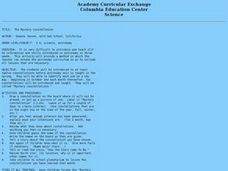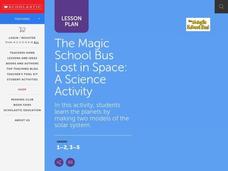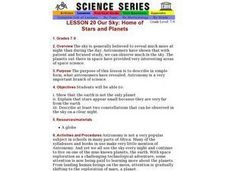Curated OER
Stellar Navigation
Students are introduced to the concept of stellar navigation. Inside a portable digital planetarium they identify various stars that were used as a navigational tool. They go through several activities in which they attempt to identify...
Curated OER
Three D Constellations
Students are introduced to both celestial coordinates and to the first rung on the distance determination ladder. They convert spherical coordinates to Cartesian coordinates to construct a three dimensional model of a constellation...
Curated OER
Stars and Slopes
Students use the slopes of various curves plotted on log-log graph paper to classify stellar objects as binary stars, supernovae, or active galaxies.The data used in this instructional activity were obtained from X-ray astronomy satellites.
University of Colorado
Clay Planets
Why do scientists use models? In the first installment of 22, groups create scale models of our solar system. They then share and discuss their models.
Stanford University
Solstice and Equinox Season Model
How can December 21 be the shortest day of the year when all days are 24 hours long? Pupils see how to build a model showing the differences between winter and summer solstices and equinoxes. Using this model, classes can then discuss...
Curated OER
The Mystery Constellation
Learners decipher two teacher chosen mystery constellations a month. They listen to stories, explain what they know about constellations and name the mystery constellation.
Curated OER
Reasons for Seasons
Students model the tilt of the Earth as it orbits the Sun. They explain the meaning and characteristics of solstices and equinoxes. They explain that sunlight hits the Earth at different angles at different locations over the course of...
Curated OER
Day and Night
Students using experiments try to demonstrate how observations can be affected by the cycles of night and day.
Curated OER
Paint By The Numbers
Learners, in groups, explore how astronomical spacecraft and computers create images of objects in space.
Curated OER
Tanabata: The Japanese "Wish Upon a Star"Festival
Learners research the legend of Tanabata in order to explain some of the astronomical findings in the night sky. The Japanese tell the story in order to explain the origin of celestial bodies.
Curated OER
Measuring Elevation
Students practice measuring elevation, one of the key coordinates used by astronomers. They describe how the elevation of an object is measured.
and combine compass directions and elevation to find celestial objects.
Curated OER
Edible Model of the Sun
Students identify the different features of the Sun. In this space science activity, students create a model of its surface using cookies and candies. They compare and contrast their model to the real Sun.
Curated OER
Lunar Cycles
Eighth graders conduct internet research on a specific website to collect information about Lunar Cycles.
Curated OER
Student Illustrations and Writing About the Sun
Students discuss what they know about the Sun. The teacher distributes work sheets and asks students to draw the Sun and label any parts of it that they know. Students write what they know about the Sun.
Curated OER
Finding Jupiter's Moons
Learners explore Jupiter's Moons. They calculate and predict the location of Jupiter's 4 large moons. In addition, they draw Jupiter with its moons correctly shown for the time of the observation.
Curated OER
Remember the Egg!
Students investigate how to see, describe and draw faint or subtle features on an object which is thought of by most people as having a smooth, featureless surface. The exercise is important to reinforce skills in making observations...
Curated OER
Astronomical Scales
High schoolers describe the different units of measurement. In this space science lesson, students calculate astronomical distances using a scale. They explain the significance of using scientific notation in expressing very small...
Curated OER
The Magic School Bus Lost in Space
Students learn along with Ms. Frizzle's class. In this Magic School Bus lesson plan, students explore outer space as they visit the Sun, Mercury, Venus, and Mars in order to learn about our solar system.
Curated OER
The Magic School Bus Out of This World
Students learn along with Ms. Frizzle's class. In this Magic School Bus lesson plan, students explore craters that objects of different sizes and weights (marbles, Ping-Pong balls, and aluminum foil balls) create.
Curated OER
Timekeeping by the Sun
Students measure shadows to learn about the Sun-Earth relationship. In this astronomy lesson, students create a shadow stick of a Pokemon character and record measurements of its shadow in a data chart. Follow-up discussions guide...
Curated OER
Astronomy With a Stick
Students find the altitude of the Sun at 10 A.M., at solar noon, and at 2 P.M. by measuring the height of the gnomon and the length of the shadow at each time. They record the measurements in their notebooks for later conversion.
Curated OER
Astronomy: Picture Time
Learners investigate how to tell time by observing the placement of objects in the sky. Researching on the Internet, they locate the time for sunrise and sunset, the time the full moon rises, and the difference between clock and solar...
Curated OER
Our Sky: Home of Stars and Planets
Students discover that astronomy is a branch of science that includes the study of planets, stars, and constellations.
Curated OER
Meteor Monitor
Student's measure sporadic meteor activity. In this physics and astronomy lesson, 11th graders construct a dipole antennae, and build, test and wire a full wave diode rectifier between the dipole antenna and the laptop.

























